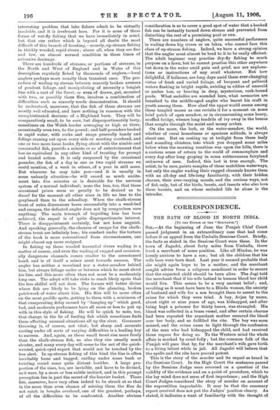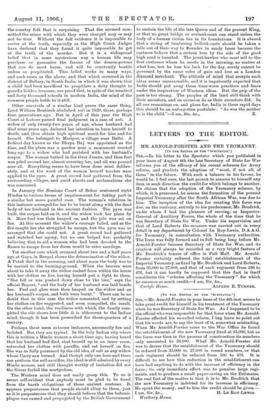CORRESPONDENCE.
THE BATH OF BLOOD IN NORTH INDIA.
[To THE EDITOR OF THE " SPECTATOR:1
SIR,—At the beginning of June the Punjab Chief Court passed judgment in an extraordinary case that had come before it on appeal from the Umballa Sessions Court. Briefly, the facts as stated in the Sessions Court were these. In the town of Jagadri, about forty miles from ITmballa, there lived a merchant of some position. Like all Hindus, he was keenly anxious to have a son ; but all the children that his wife bore were born dead. Last year it seemed probable that she might again hope to be a mother, and the merchant sought advice from a religious mendicant in order to secure that the expected child should be born alive. The Jogi told the merchant that if his wife bathed in human blood her child would live. This seems to be a very ancient belief ; and, revolting as it must have been to a Hindu woman, the anxiety of husband and wife for a son brought them to assent to the crime for which they were tried. A boy, Arjan by name, about eight or nine years of age, was kidnapped, and after being kept a prisoner for thirty hours, was strangled. His blood was collected in a brass vessel, and after certain charms had been repeated the expectant mother smeared the blood over her body, and so fulfilled the rite. The boy was soon missed, and the crime came to light through the confession of the man who had kidnapped the child, and had received three rupees for doing so. To the Western mind the whole affair is marked by cruel folly ; but the common folk of the Punjab will pass that by, for the merchant's wife gave birth to a living infant while in jail. All Jagadri will believe that the spells and the rite have proved potent.
This is the story of the murder and its sequel as heard in the Sessions Court. In the High Court the sentences passed by the Sessions Judge were reversed on a question of the validity of the evidence and on a point of procedure, which to the lay mind does not seem of first importance; and the High Court Judges considered the story of murder on account of the superstition improbable. It may be that the summary report xeceived does not put the Judges' position clearly. As stated, it indicates a want of familiarity with the thought of the country folk that is surprising. That the accused com- mitted the crime with which they were charged may or may not be true. Without the full evidence it is impossible to arrive at the truth, especially as the High Court Judges have declared that they found it quite impossible to get at the truth of the 'murder. But it is a widespread belief that in some mysterious way a human life may purchase or guarantee the favour of the demon-powers that can do most harm, and will be constantly hostile
unless so propitiated. This belief works in many ways, and such cases as the above, and that which occurred in the
district of Bellary, in South India, in which it was shown that a child had been sacrificed to propitiate a deity thought to guard a hidden treasure, are proof that, in spite of the hundred and forty thousand schools in modern India, the mind of the common people bolds to it still.
Other survivals of a similar kind prove the same thing. Lord William Bentinck abolished sati in 1829, three, perhaps four, generations ago. But in April of this year the High Court at Lahore passed final judgment in a case of sati. A widow of only twenty-two years of age, whose husband had died some years ago, declared her intention to burn herself to death, and thus obtain high spiritual merit for him and for herself. She belonged to Maripur, a village near Delhi. A festival day known as the Bhaya Daj was appointed as the time,, and the place was a garden near a monument erected long ago to a widow who had perished with her husband's corpse. The woman bathed in the river Jumna, and then fuel was piled around her, almost covering her, and oil was poured over all. Everything seems to have been done most deliber-
ately, and at the word of the woman herself torches were applied to the pyre. A great crowd had gathered from the surrounding villages, and amid shouts and acclamations she was consumed.
In January the Sessions Court of Behar sentenced eight Hindus to various terms of imprisonment for taking part in a similar but more painful case. The woman's relatives in this instance arranged for her to be burnt along with the dead body of her husband in the ancient fashion. The pyre was built, the corpse laid on it, and the widow took her place by
it. More fuel was then heaped on, and the pile was set on fire. At this moment the widow's courage failed, and as the
fire caught her she struggled to escape, but the pyre was so arranged that she could not. A great crowd had gathered and watched her agony, but no one helped her, probably believing that to aid a woman who had been devoted to the flames to escape from her doom would be utter sacrilege.
Yet another case which occurred about two and a half years ago at Gaya, in Bengal, shows the determination of the widow.
A Patak died in the morning, and about noon the body was to be carried to the burning-ground. When the bearers were about to take it away the widow rushed from within the house with her clothes on fire, having herself put a light to them.
"She fell or was pushed down close to the bier," says the official Report, "and the body of her husband was laid beside her. Fuel and ghee were then heaped on the widow and on her husband's corpse, and both were burnt." There can be no doubt that in this case the widow consented, and by setting
her clothes on fire suggested, and even compelled, the result. On the other band, the readiness with which the family com- pleted the rite shows how little it is abhorrent to the Indian mind, though it has been proscribed for three-quarters of a century.
Perhaps these seem extreme instances, necessarily few and isolated. But they are typical. In the holy Indian city where this is written a Hindu woman a short time ago, having heard that her husband had died, shut herself up in an inner room, saturated her clothes with paraffin, and set herself on fire.
She was as fully possessed by the old idea of sati as any widow whom Carey saw burned. And though only one here and there can perform the self-sacrifice, the ideal is still admired by every Hindu woman, and still thought worthy of imitation did not the Sircar forbid the martyrdom.
The Western mind does not easily grasp this. To us it seems self-evident that anybody must be glad to be freed from the harsh obligations of these ancient customs. It appears preposterous that people should cling to them,-just
salt is preposterous that they should believe that the bubonic plague was caused and propagated by the British Government to sustain the life of the late Queen and of the present King, or that no great bridge or embankment can stand unless the body of a human victim lies in its foundations. It is absurd that a string of lumbering bullock-carts should be taken a mile out of their way to flounder in sandy lanes because the cartmen believe that a certain tree by the side of the good high road is haunted. The jewel-hawker who must sell to the first customer whom he meets in the morning, no matter at what loss, lest he lose his luck for the day, surely cannot be governed by the same rules of gain and loss as a London diamond merchant. The attitude of mind that accepts such ideas seems unreasonable, and it is impatiently expected that India should put away these time-worn practices and fears under the inspiration of Western ideas. But the grip of the past is too strong. The peoples of the land still think with their ancestors, and on occasion do as their ancestors did. In all our reasonings on, and plans for, India in these rapid days this should be an unforgotten postulate : "As was the mother
so -is the child."—I am, Sir, &c., Z.



































 Previous page
Previous page